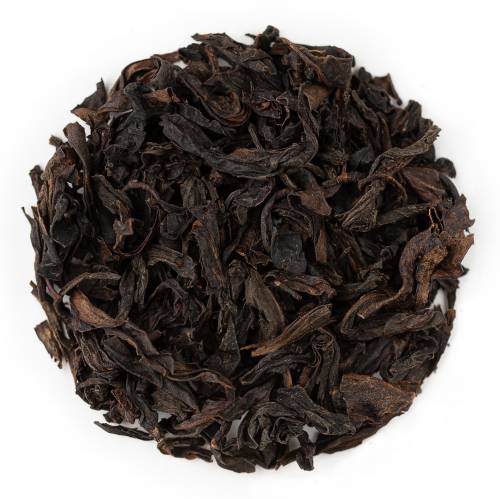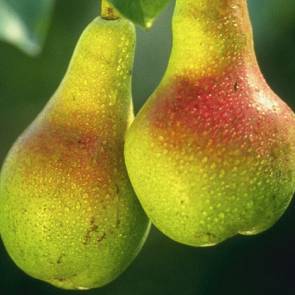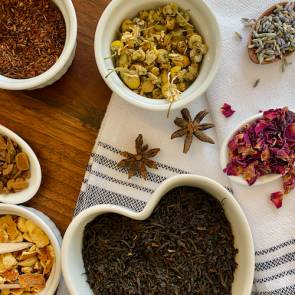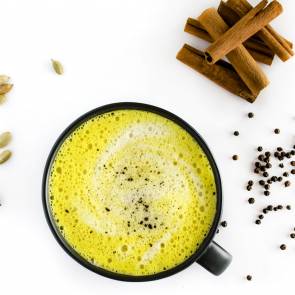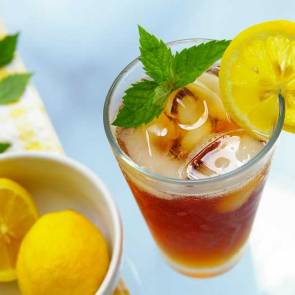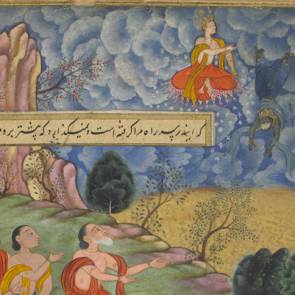Wholesale/Bulk Bountiful Oolong Tea Options
You can now purchase the Bountiful Oolong Tea Blend in wholesale and bulk quantities from Shanti Tea Importers, making it an ideal option for tea retailers and kombucha brewers in the United States and Canada. This blend, known for its luxurious and indulgent taste with dark chocolate notes, a hint of smokiness, and a malty finish, is available for private and white-label customization. By partnering with Shanti Tea Importers, you can tailor the packaging and branding to suit your specific needs, offering your customers a high-quality, enjoyable tea while enhancing your brand's product offerings.
What is Oolong Tea?
Oolong tea, also known as "Wu Long" tea, is a traditional Chinese tea that falls somewhere between green and black tea in terms of oxidation and flavour. Originating from the Fujian province of China and Taiwan, Oolong tea is known for its unique and complex flavour profile that ranges from sweet and fruity to thick and creamy, with distinct floral and earthy notes.
The production of Oolong tea involves a meticulous process. Freshly picked leaves are withered under the sun, shaken in baskets to bruise the edges, and then allowed to oxidize. This partial oxidation gives Oolong tea its distinctive characteristics. The leaves are then pan-fired or baked to stop oxidation, rolled, and dried. The oxidation level can vary, resulting in different flavours and aromas, from lightly oxidized (similar to green tea) to heavily oxidized (similar to black tea).
Benefits of Drinking Bountiful Oolong Tea
Oolong tea offers a variety of health benefits due to its unique blend of antioxidants, vitamins, and minerals. It boosts metabolism and aids in weight loss by increasing fat oxidation [1] and improving digestive health [2]. Drinking Oolong tea can enhance energy levels and mental alertness, making it a perfect beverage for maintaining focus and productivity throughout the day.
Oolong tea also supports heart health by reducing LDL cholesterol levels [3] and improving overall cardiovascular function [4]. It has anti-inflammatory properties that can help reduce inflammation and support overall well-being [5]. Additionally, Oolong tea promotes healthy skin by combating free radicals [6] and improving hydration. Regular consumption of Oolong tea can also aid in blood sugar regulation, making it beneficial for individuals with diabetes or those at risk [7].
References:
- Hursel R, Viechtbauer W, Westerterp-Plantenga (2009) MS. Int J Obes (Lond). https://pubmed.ncbi.nlm.nih.gov/19597519/
- Lei Wang et al. (2022). J Nutr. https://www.ncbi.nlm.nih.gov/pmc/articles/PMC10196597/
- Hosoda K. et al. (2023) . https://pubmed.ncbi.nlm.nih.gov/12766099/
- Yohei Mineharu et al. (2011) J Epidemiol Community Health. https://pubmed.ncbi.nlm.nih.gov/19996359/
- Ayami Hisanaga et al. (2014). Food Funct. https://pubmed.ncbi.nlm.nih.gov/24947273/
- Pooja Sharma et al (2018). Photodermatol Photoimmunol Photomed. https://www.ncbi.nlm.nih.gov/pmc/articles/PMC5774988/
- Hosoda K et al. (2003). Diabetes Care. https://pubmed.ncbi.nlm.nih.gov/12766099/
Organic Oolong Tea vs. Regular Oolong Tea
The primary difference between organic and regular Oolong tea lies in their cultivation and production practices. Organic Oolong tea is grown without synthetic fertilizers, pesticides, or herbicides, using natural methods like composting and crop rotation to maintain soil fertility and control pests. This promotes environmental sustainability and biodiversity and reduces pollution. Organic Oolong tea must meet specific standards set by certification bodies like USDA Organic or EU Organic, ensuring adherence to strict organic farming guidelines.
In contrast, regular Oolong tea may be grown using conventional farming methods that often involve synthetic chemicals, which can lead to environmental issues such as soil degradation and water contamination. While regular Oolong tea can offer excellent flavour profiles and is generally safe for consumption, organic Oolong tea is preferred by those seeking to avoid chemical residues. The natural farming methods of organic Oolong tea can result in subtle flavour differences, potentially enhancing the tea's purity and complexity. However, organic Oolong tea is often more expensive due to labour-intensive practices and certification costs, whereas regular Oolong tea is typically more affordable. The choices involve environmental impact, health concerns, flavour preferences, and cost.

